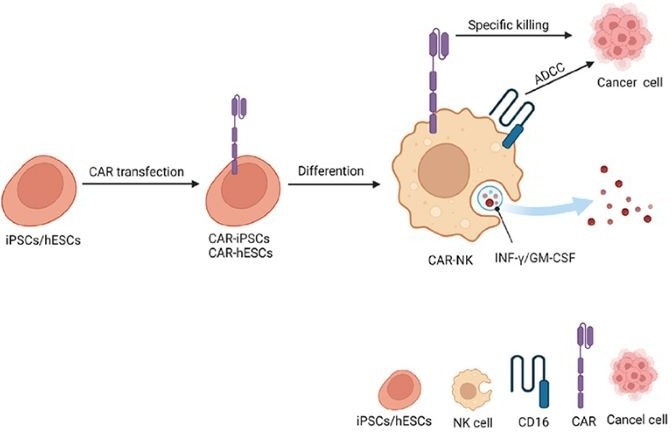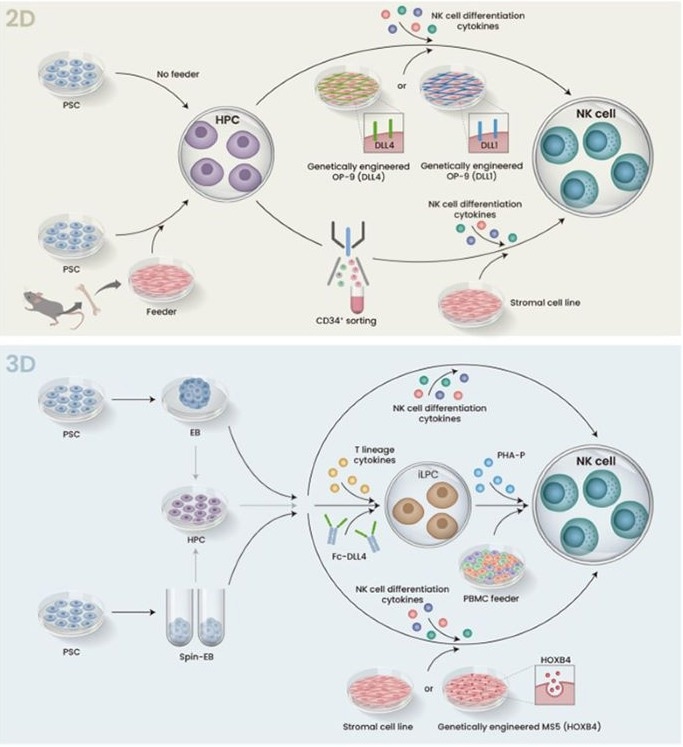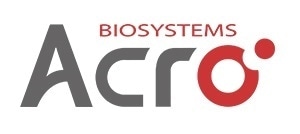Natural killer (NK) cells are essential effectors of the innate immune system. These cells exhibit potent anti-tumor capabilities, making them appealing candidates for cancer immunotherapy.
While chimeric antigen receptor (CAR) technology was initially developed for T cells, the potential for engineering CAR-modified NK cells has gained significant attention from the medical and scientific communities.
CAR-NK cell therapy builds on the underlying principles of CAR-T cell therapy, but this technique also incorporates a wide range of innovations tailored to the distinct biological features of NK cells.
CAR-NK research gained prevalence slightly after CAR-T research, but its universal applicability, off-the-shelf availability, and potential efficacy against solid tumors have seen CAR-NK become recognized as a critical breakthrough in the cellular immunotherapy field.

Figure 1. Schemic representation of iPSC-derived CAR-NK allogeneic cell therapy. Differentiation (Hang). 2023; 130:51-57. Image Credit: ACROBiosystems
Advantages of CAR-NK cell therapy
Excellent safety profile
A primary advantage of CAR-NK over autologous CAR-T is the superior safety profile afforded by CAR-NK. CAR-T cell therapies are undeniably effective, but these are often linked to serious side effects, including neurotoxicity and cytokine release syndrome (CRS).
However, CAR-NK cells have exhibited significantly reduced rates of CRS and neurotoxicity and CRS. This reduction in side effects can be partially attributed to NK cells’ tendency to proliferate to a lesser extent than T cells upon activation and their shorter lifespan in circulation. These factors combine to naturally limit CAR-NK cells’ ability to induce protracted pro-inflammatory responses.
The distinct cytokine profiles secreted by these cell types play a role in side effect mitigation. For example, activated NK cells primarily produce IFN-γ and GM-CSF while activated, whereas CAR-T cells produce cytokines more closely linked to CRS and neurotoxicity, including IL-2, IL-6, and IL-8.
Broad-spectrum anti-tumor activity
CAR-NK cells display a robust broad-spectrum anti-tumor activity that offers a number of benefits over that of CAR-T therapies. CAR-T cells can be engineered to target a particular antigen on tumor cells, but NK cells have the ability to recognize and kill tumor cells independently of CAR targeting.
This broad-spectrum activity is due to their innate ability to detect stress signals and a lack of human leukocyte antigen (HLA) class I molecules on tumor cells, which are common strategies by which cancer cells evade the immune system.
NK cells can also mediate antibody-dependent cellular cytotoxicity (ADCC), which is something that CAR-T cells cannot do. NK cells can, therefore, be effective against a wider range of tumors, including tumors that may develop specific mechanisms to avoid CAR-T cell recognition.
Development of universal, off-the-shelf therapies
The majority of autologous CAR-T cell therapies involve complicated, time-consuming, and arduous manufacturing processes.
In contrast to most autologous CAR-T cell therapies, which involve complex, time-consuming, and laborious manufacturing processes, CAR-NK cells do not require HLA matching. As such, the risk of allogeneic responses and graft-versus-host disease is significantly reduced.
In addition, NK cells can be sourced from a range of different origins, including umbilical cord blood (UCB), peripheral blood mononuclear cells (PBMCs), the NK92 cell line, and induced pluripotent stem cells (iPSCs).
iPSC-derived CAR-NK cell therapy
Advantages of iPSC-derived NK cells
The innate advantages of NK cells mean that CAR-NK cell therapy offers immense potential for the development of allogeneic and scalable products, unlike the primarily autologous nature of CAR-T cell therapies.
However, the choice of cell source significantly impacts the realization of these characteristics. It is important to note that where primary NK cells are derived from diverse sources (representing a heterogeneous mixture of highly differentiated cells), these pose a range of challenges for genetic engineering and ex vivo expansion. The identification and characterization of modified primary cells can also be difficult.
In contrast, iPSCs are clonal cell lines that can be genetically modified at the stem cell stage, allowing for unlimited expansion and controlled differentiation into NK cells, therefore forming the basis for scalable and robust manufacturing processes.
As such, iPSCs are known to offer several advantages over other currently available NK cell sources.
iPSC-NK differentiation culture
Two- or three-dimensional culture systems can be employed in iPSC-NK cell differentiation, each offering its advantages and limitations.
The two-dimensional culture system for NK cell differentiation will generally involve co-culturing human PSCs with genetically engineered feeder cells expressing Notch ligands (DLL1 or DLL4) or mouse bone marrow stromal cells in order to promote hematopoietic differentiation.
Once this has been done, sorted hematopoietic progenitor cells (HPCs) will typically be co-cultured with a further stromal cell line and a cytokine cocktail containing IL-3, IL-7, IL-15, Flt3L, and SCF, to generate PSC-derived NK cells.
This system has been used for both induced pluripotent stem cells (iPSCs) and embryonic stem cells (ESCs), and studies have shown that this approach can produce functional NK cells capable of cytokine production and cytolytic activity against tumor cells, both in vitro and in vivo.
The three-dimensional culture system involves the formation of embryoid bodies (EBs) from PSCs that have been cultured in suspension. These EBs will spontaneously differentiate toward specific cell lineages in response to exposure to exogenous cytokines.
Different techniques have been developed to enhance reproducibility; for example, spin-EBs (centrifugation to produce uniform-sized EBs) and feeder-free systems using recombinant proteins like FcDLL-4.
These three-dimensional systems do not use feeder cells, so they are more suitable for clinical applications and compliance with good manufacturing practices (GMP).
It should be noted, however, that further optimization is required to achieve pure and efficient iPSC-NK differentiation when employing these three-dimensional approaches.

Figure 2. Schemic illustration of 2D and 3D protocol for iPSC differentiation to NK cells. Image Credit: ACROBiosystems
All in all, researchers can leverage the benefits of both two-dimensional and three-dimensional platforms at a range of differentiation stages to optimize iPSC-NK cell production for both research and therapeutic applications.
Allogeneic CAR-NK therapy companies
The field of CAR-NK cell therapy continues to advance at speed, with a number of biotechnology companies recently emerging as key players in translating this innovative therapy into clinical practice.
These companies are helping to revolutionize cancer treatment by leveraging pioneering technologies to develop allogeneic, off-the-shelf CAR-NK cell products.
Companies such as Nkarta Therapeutics, Fate Therapeutics, and Century Therapeutics are leaders in this field, each employing a unique platform and bespoke strategies to address the challenges linked to manufacturing, scaling, and improving the therapeutic potential of CAR-NK cells.
Nkarta Therapeutics
Based in the United States, Nkarta Therapeutics is developing a range of allogeneic, off-the-shelf NK cell-based therapies designed to treat cancer.
The company’s lead products – NKX101 and NKX019 – are able to effectively target NKG2D and CD19, each of which tends to be overexpressed in cancer cells.
Nkarta Therapeutics is currently undertaking preclinical studies to treat solid tumors. The company’s technology platform has been designed to maximize the therapeutic effects of allogeneic NK cells via the robust expansion, improved targeting, and extended persistence of these powerful immune cells.
Fate Therapeutics
Fate Therapeutics is at the forefront of programmed cellular immunotherapy developments designed to treat cancer and immune disorders. The company focuses on off-the-shelf NK product development, with its FT576 and FT522 products derived from iPSCs.
Fate Therapeutics is working to revolutionize how cancer and immune disorders are treated by leveraging iPSCs’ unique properties to produce immune cells with improved therapeutic potential.
Century Therapeutics
Century Therapeutics has assembled a comprehensive portfolio of allogeneic iPSC-derived NK, γδ, and αβ T cell therapy product candidates suitable for the treatment of cancer and autoimmune and inflammatory diseases.
Its proprietary Allo-Evasion™ technology has been specifically developed to help prevent host rejection while potentially improving the durability of clinical responses.
Ongoing development of this platform has enabled the generation of cells with pan-resistance to host T cell, NK, and antibody-mediated rejection. These developments have also helped to optimize and increase success rates in the company’s programs across oncology, hematology, autoimmune and inflammatory diseases.
Can NK cell therapy surpass the limitations of CAR T?
CAR-NK cell therapy offers numerous advantages over traditional CAR-T therapies, positioning these techniques as a potentially superior modality for targeted immunotherapy.
CAR-NK cells demonstrate a remarkably improved safety profile with lower risks of severe toxicities like neurotoxicity, CRS, and GvHD while continuing to exhibit potent anti-tumor activity against a wide range of malignancies.
The innate tumor-killing mechanisms of NK cells, coupled with the scalability of induced pluripotent stem cell technology, means that CAR-NK therapies could be key to developing universal, off-the-shelf products that avoid the inherent challenges of autologous CAR-T manufacturing.
The unique biological features of CAR-NK cell therapies and their potential for improved efficacy and safety could see them emerging as the next stage in targeted cancer immunotherapy, confidently surpassing CAR-T approaches’ current limitations.
ACROBiosysystems is committed to the development of high-quality cell culture reagents that are key to the ongoing development of immune cell therapy at the clinical stage.
The company makes use of a stringent GMP-grade quality management system, enabling the successful development of a diverse array of high-quality GMP-grade growth factors; for example, VEGF165, Flt-3L, SCF, DLL4, IL-2, IL7, and IL15.
These growth factors have been specifically designed to support iPSC-derived NK cell therapy development and enable large-scale clinical manufacturing.
References and further reading
- Hang S, Wang N, Sugimura R. T, NK, then macrophages: Recent advances and challenges in adaptive immunotherapy from human pluripotent stem cells. Differentiation. 2023 Mar-Apr;130:51-57. doi: 10.1016/j.diff.2023.01.001. Epub 2023 Jan 18. PMID: 36682340.
- Karagiannis P, Kim SI. iPSC-Derived Natural Killer Cells for Cancer Immunotherapy. Mol Cells. 2021 Aug 31;44(8):541-548. doi: 10.14348/molcells.2021.0078. PMID: 34373366; PMCID: PMC8424143.
- Shankar, K., Capitini, C.M. & Saha, K. Genome engineering of induced pluripotent stem cells to manufacture natural killer cell therapies. Stem Cell Res Ther 11, 234 (2020). https://doi.org/10.1186/s13287-020-01741-4
- Goldenson BH, Hor P, Kaufman DS. iPSC-Derived Natural Killer Cell Therapies - Expansion and Targeting. Front Immunol. 2022 Feb 3;13:841107. doi: 10.3389/fimmu.2022.841107. PMID: 35185932; PMCID: PMC8851389.
Acknowledgments
Produced from materials originally authored by ACROBiosystems.
About ACROBiosystems
ACROBiosystems is a cornerstone enterprise of the pharmaceutical and biotechnology industries. Their mission is to help overcome challenges with innovative tools and solutions from discovery to the clinic. They supply life science tools designed to be used in discovery research and scalable to the clinical phase and beyond. By consistently adapting to new regulatory challenges and guidelines, ACROBiosystems delivers solutions, whether it comes through recombinant proteins, antibodies, assay kits, GMP-grade reagents, or custom services. ACROBiosystems empower scientists and engineers dedicated towards innovation to simplify and accelerate the development of new, better, and more affordable medicine.
Sponsored Content Policy: News-Medical.net publishes articles and related content that may be derived from sources where we have existing commercial relationships, provided such content adds value to the core editorial ethos of News-Medical.Net which is to educate and inform site visitors interested in medical research, science, medical devices and treatments.